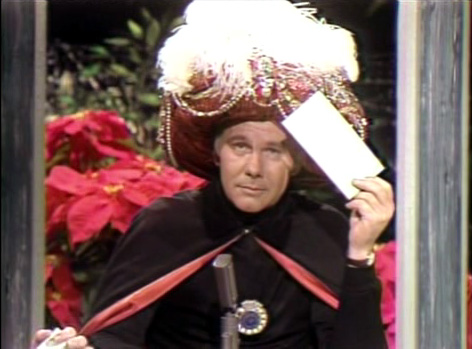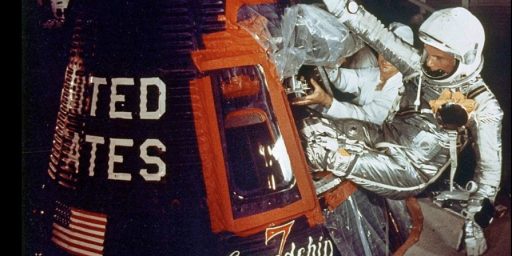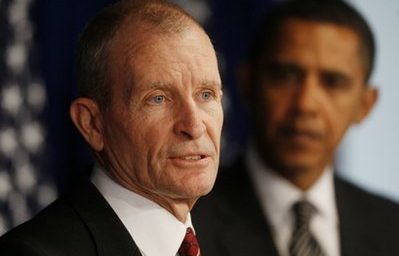Iraq War Casualty Predictions
 Tim Lambert linked some prewar Iraq War casualty predictions collected by John Hawkins in early 2003:
Tim Lambert linked some prewar Iraq War casualty predictions collected by John Hawkins in early 2003:
If we go into Iraq, how many casualties do you expect to see (on the side of the US and our allies)
John Hawkins: “Probably 300 or less”
Charles Johnson:“Very few”
Henry Hanks: “Less than 200”
Laurence Simon: “A Few hundred”
Rachael Lucas: “Less than three thousand”
Scott Ott: “Dozens”
Glenn Reynolds: “Fewer than 100”
Tim Blair: “Below 50”
Ken Layne: “a few hundred”
Steven Den Beste: “50-150”
Fester and Hilzoy have passed these on as well. Good fun is had by all.
Having begun blogging only at the end of January 2003, I wasn’t surveyed. I did, however, predict on February 24 that “victory in Iraq will be swift and relatively bloodless.” I don’t recall whether I actually blogged my casualty predictions but my internal working estimate was the same as Hawkins’ – 300 or fewer American troops killed. I figured, basically, that it would be “Desert Storm times two.”
We’re now at something like 4326 American troops dead.
Then again, I wasn’t counting on a multi-year occupation during which we fought against multiple insurgent groups while trying to democratize Iraq. I presumed, as did Don Rumsfeld and others, that we would topple Saddam Hussein’s government, install an interim government, and elect a permanent government within some short period.
That’s the war I supported and still wish that’s what we’d done.
________________________________________
Digressions:
1. The more interesting finding in Hawkins’ poll is this:
Will a human baby be cloned in 2003?
Yes: John Hawkins, Charles Johnson, Henry Hanks, Laurence Simon, Rachael Lucas, Scott Ott
No: Glenn Reynolds, Tim Blair, Ken Layne
N/A: Steven Den Beste
So far as I’m aware, none was cloned in 2003, 2004, 2005, 2006, 2007, 2008, or the first half of 2009. It’s remarkable how excited people were at this prospect.
2. OTB was a decidedly different blog in the early days. Few of my posts in February 2003, my first real month of blogging, were as long as the Digressions section of this post.






It would be helpful if people meditated on this, rather than snarking on body count predictions.
At any rate, for clarity (since I didn’t read you back then) when you say you, “weren’t counting on..”, do you mean you disregarded the notion, or it hadn’t occurred to you?
Both, really. Most of the anti-war arguments had to do with the optionality of invasion rather than the prospect of setting off turmoil in Iraq. To the extent heavy casualties were predicted, it was based on an overestimation of the staunchness of the resistance to invading Baghdad and toppling Saddam.
Further, it never occurred to me that our actual mission would creep to the level that it did. Bush was famously against nation-building and, by all accounts, the planning largely ignored the postwar phase. Everyone pretty much expected to go home by late 2003.
James, I seem to recall that the State Department apparatus, with its experience in nation building, was left out of Rumsfeld assessments.
More than that I recall that they weren’t called on to staff the initial occupation staff, the preference being for “20-something Neocons.”
Maybe you should give us some “near the beltway” history on who around you were packing their bags, and how (non)political their biases were.
BTW, don’t forget this bit from 2003:
Thanks for the extra info.
This struck me. I was barely out of high school when we went to Iraq. It’s sometimes difficult to remember how we used to view the world and its various actors. I wonder what kind of look you would get today if you told an 18 year old that “Bush was famously against nation-building.”
We all know that events change things, including people, but again, (and maybe this is my own personal problem and I’m sharing too much) but so much of the (even recent) past seems kind of foggy.
I didn’t have a prediction for invasion casualties. However, I did predict that the casualties we took up until the infamous “Mission Accomplished” incident would be a fraction (I thought half) of the total casualties.
As it turns out that was an underestimate.
I think “Bush was famously against nation-building” is a retroactive political claim. On the other hand, what he said at the time:
I guess the political claim here is that since Bush’s administration did such an absolutely bad job of achieve its goal, it must never have been for it in the first place?
From a little bit later, in 2005:
How do you square that with our efforts in Afghanistan from October 2001 through the start of the Iraq war some ~18 months later?
Running for the 2000 election, I distinctly remember Bush rejecting nation building. Maybe my memory is faulty. Anyway, I think Sullivan has off and on collected a bunch of similar predictions by Kristol and other luminaries.
If you have not, I would highly recommend Olson’s recent look at what went wrong. We clearly had little political involvement in the Iraq war. It was all military dictated, with the political involvement usually negative when it did occur. I especially like his comments on page 34. As he phrased it, “But the most difficult lesson in situations such as Iraq—regime change—is
a negative one: you cannot do conflict planning without post-conflict planning. They are a
package deal, a linked situation.”
Steve
Since you’ve disposed of the inaccurate nation building claims in your later post, I’d like to expand on BJ’s initial question, James.
Do you believe that we didn’t exit Iraq as quickly as many expected because of poor predictions on what the aftermath of the invasion would be, or because the invasion was executed poorly?
If the former, were accurate predictions possible but bungled, or was the Bush Administration legitimately surprised by how it worked out? If the latter, what were the shortcomings in its execution?
Hey, you might as well expound on these questions since nothing much happens around here on Fridays.
All of the low-ball predictions mentioned were a product of the same monstrously boneheaded mistake we made in Vietnam and have made in almost every other post WWII conflict except the cold war, we didn’t really have any true experts on the region advising the military and civilian leadership as to the likely results of their chosen course of action.
With the exception of a very few people who deeply understood the social/political/historical situation in Iraq and the surrounding countries in the region(who were to a person dismissed as liberal/peace nick/weenies who just didn’t get the grand neo-con vision because of their inability to understand the simplicity of the situation), no one bothered to call in a few anthropologists to find out what the predicable outcome of an American invasion would be.
I for one knew we would still be in both countries at least 10 years later, and it didn’t take much in the way of deep thinking to figure that was entirely plausible if not inevitable.
Bill Quick called me the biggest idiot on the face of the planet when I suggested that our involvement in Iraq would outlast Bush even if he were to win a 2nd term. Fate is that James, your side on this debate (the pro invasion hawks) where wrong, wrong, dead wrong, and not just wrong on scale. They wrong about the entire idea that an invasion was better then allowing Saddam to fester in his own contained hell hole till the Iraqi people decided it was enough.
James: I’m not asking this question in a snarky way at all, but:
How did you expect that this short occupation would actually happen? I mean, we could have just deposed Saddam and left, but that would have been appalling. What interim government was there to be installed? My sense was that everyone who might have led such a government inside the country had been killed, and that the exiles were deeply untrustworthy, and (more to the point) that the level of their popular support in Iraq was totally unknown, and quite possibly zero.
And that leaves creation of a government ex nihilo as the only remaining possibility. It was certainly (I thought) a possibility that had to be taken seriously, if the exiles didn’t work out, as seemed likely.
As I said, I’m really not trying to be snarky about this. (There are people I wouldn’t bother asking, because I wouldn’t expect them to have an actual serious answer to this question.) But I am, genuinely, curious.
Kenneth Pollack predicted 500 to 1,000 casualties, with 10,000 as worst case scenarios. Since Josh Marshall and Andrew Sullivan outsourced much of their blog thoughts on the war to Pollack, I assume that was their prediction as well.
and
In hindsight, I’m not sure what I thought. Probably, I just figured that the war planners had already prepared for the contingency. Probably, Chalabi and his boys.
Basically, you put an Iraqi face in charge, announce that there will be elections is some short, specified point in the future, and provide security assistance in the interim.
We botched a number of things, notably 1) failing to pay off the existing army and police forces, 2) ridding the government of competent bureaucrats through de-Baathification, and 3) inexplicably failing to secure the oil fields and weapons stockpiles. How things would have gone differently had we not made those obvious mistakes, I dunno. But we might well have avoided the massive insurgent violence.
It seems like a lot of conservatives fell into the same trap that some of them often accuse liberals of falling into, namely, that the government will somehow step in and marvelously transform some situation (in this case, Iraq…in the case of liberals, something like domestic poverty) into some beautiful outcome…beware the magic ponies…
The problem is trying to figure out the irrational mindset of al-Qaeda, who basically kamikazed themselves in Iraq.
”
We botched a number of things, notably 1) failing to pay off the existing army and police forces, 2) ridding the government of competent bureaucrats through de-Baathification, and 3) inexplicably failing to secure the oil fields and weapons stockpiles. How things would have gone differently had we not made those obvious mistakes, I dunno. But we might well have avoided the massive insurgent violence.”
Failing to provide adequate security for Iraqis and their important sites was also key. When Zinni war gamed this, he estimated a need of about 300k troops. I would love to know why they rejected his results. Do we need McMaster to explain this?
Steve
I thought we were doing Japan 1945.
I thought we’d go in big, crush resistance, buy those who could be bought, write a constitution and ram it down the Iraqis throats, spend some money building institutions and infrastructure, then babysit them for 10 years while they adjusted.
It never occurred to me that the president was dumb enough to think this was a quick smash-n-run job. It never occurred to me we’d dither around without enough troops to maintain order, allow a counter-insurgency to grow, and insist on letting the Iraqis invent their own “democracy.”
I underestimated Mr. Bush’s stupidity. Oh, I knew he was stupid. Didn’t know he was that stupid.
Nah. To do that we’d’ve needed to defeat the people rather than just defeating the government. We killed something like 4% of the Japanese population.
Dave:
You know, my first indication we weren’t going that way was when I realized commanders were basically fighting a war of maneuver.
I assumed we’d be bombing enemy troop concentrations, not cutting them off then letting them melt into the alleyways.
It’s when I first got this tingling on the back of the neck that this was going to be screwed up. And then when we admitted we didn’t have the troops to stop looting? And couldn’t even protect major oil facilities? You could feel the power vacuum.
Just because we have now mastered the art of using a scalpel instead of the sledgehammer we used to win WW2 that doesn’t mean the scalpel is necessarily the best tool in the kit. We’d have saved more American (and Iraqi civilian) lives if we’d taken more Iraqi army lives.
Occupations 101: Place boot firmly on neck.
Michael-The neocon fantasy was that we would convert Iraq to a democratic ally that would let us use their country as a place from which to launch our war against Iran. Wasnt gonna happen with our boots on their necks.
Steve
I am short of time just now (and have not read all the comments), but did this strike anyone else as rather…
Condescendingly “colonial”?
And for the record… I thought we would do the same by now, just at a much higher cost than we have paid so far.
Hubris…
Given that the democracy happy talk turned out to be an actual political objective rather than the standard hyperbole used when rallying a democracy to fight, that’s sort of where I thought we should have gone.
You can smash and run if your objective is merely regime change and sending a message that you’d better behave or this will happen to you. Using that approach, you get rid of the worst of the worst and leave the native grown-ups who know what they’re doing in charge. That means no de-Baathification and leaving all but Saddam’s top cronies in place.
The military as a conversion tool for society model is not one I think useful. If that’s your mission though, you’ve got to then set up an army of occupation. You can run a benevolent government and give the locals as much dignity as possible — still keeping the bureaucrats, military, and police rank-and-file in place and drawing a paycheck — but you’re running the show.
We wound up with the worst of both worlds: A too ambitious mission, a too-small force, and pretending that the Iraqis were “sovereign” when they weren’t.
James: “Then again, I wasn’t counting on a multi-year occupation during which we fought against multiple insurgent groups while trying to democratize Iraq. I presumed, as did Don Rumsfeld and others, that we would topple Saddam Hussein’s government, install an interim government, and elect a permanent government within some short period.”
Installing an interim government in a place that’s been a one-party state since the 1960’s (?) is not exactly a quick and easy thing.
“Given that the democracy happy talk turned out to be an actual political objective rather than the standard hyperbole used when rallying a democracy to fight, that’s sort of where I thought we should have gone. ”
Wrong – an actual Iraqi democracy was plan D. Plan A was to install Chalabi and his couple o’ hundred guys; this melted like an ice cube in a blast furnace. Plan B was to directly run Iraq as a military dictatorship. This didn’t work so well; we had none of the will, force or competancy to do so.
Plan C was to find out just how many Shiites Sistani could put into the streets, and to find out just how hard it’d be to fight both the Shiites (~60% of Iraq) *and* the Sunni Arabs (~20%).
At that point, the US government wisely chose Plan D – work with the Shiite militia groups which didn’t mind working with us (of course, they didn’t mind working with us only so long as they needed us).
“Most of the anti-war arguments had to do with the optionality of invasion rather than the prospect of setting off turmoil in Iraq. To the extent heavy casualties were predicted, it was based on an overestimation of the staunchness of the resistance to invading Baghdad and toppling Saddam.”
As has been pointed out above, the actual expert opinion was that we were talking a few to several hundred thousand soldiers, for years. Which was both an anti-(it’ll be quick, cheap and easy!) war opinion, and one that you really should have paid attention to, IMHO.
This war is the second expensive for U.S. after the World War II. Here I’ve tried to summarize all costs of the Iraq war for Americans:
http://www.myhowtoos.com/en/red-hot/86-all-costs-of-war-in-iraq-for-usa